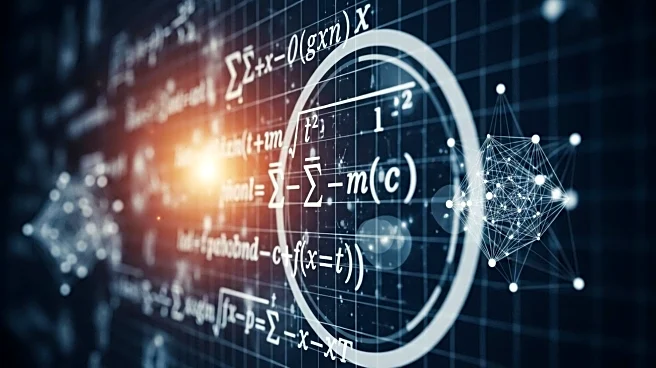What's Happening?
A recent study conducted by Robert G. Endres from Imperial College London has introduced a mathematical framework that challenges existing theories about the origins of life on Earth. The research suggests that the spontaneous emergence of life from nonliving matter may have been far more difficult than previously thought. By applying information theory and algorithmic complexity, Endres analyzed the probability of the earliest living cell, known as a protocell, self-assembling from simple chemical components. The study highlights the immense challenge of generating structured biological information under realistic prebiotic conditions, indicating that chance alone may not sufficiently account for the origin of life within the limited timeframe of early Earth.
Why It's Important?
The findings of this study have significant implications for our understanding of life's origins and the scientific exploration of biological physics. By quantifying the mathematical challenges involved, the research suggests that current knowledge may be lacking and that new physical principles or mechanisms may need to be discovered to overcome these informational barriers. This study represents an important step toward making the study of life's origins more mathematically rigorous, potentially leading to new insights into one of science's most enduring questions. The research also opens the door to considering alternative theories, such as directed panspermia, which posits that life might have been intentionally seeded on Earth by advanced extraterrestrial civilizations.
What's Next?
The study encourages further exploration into the physical principles behind life's emergence from nonliving matter. Researchers may need to develop new models or theories that can account for the structured arrangements required for life to form naturally. The study also suggests that interdisciplinary approaches combining mathematical precision with biological questions could reveal new depths to age-old puzzles about our existence. As scientists continue to investigate these challenges, the potential for groundbreaking discoveries in the field of biological physics remains high.
Beyond the Headlines
The study's implications extend beyond the scientific community, potentially influencing philosophical and ethical discussions about the nature of life and our place in the universe. The consideration of alternative theories, such as directed panspermia, challenges traditional scientific paradigms and invites broader discourse on the possibility of extraterrestrial influence on Earth's biological history. This research underscores the importance of maintaining scientific rigor while remaining open to unconventional ideas that could reshape our understanding of life's origins.










